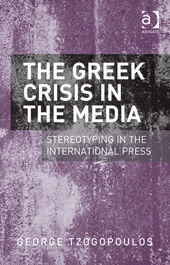Sklias P., Tzifakis N. (eds.) (2013), Greece’s Horizons: Reflecting on the Country’s Assets and Capabilities, Springer. The Greek financial crisis has imperilled the stability of the entire euro-zone, generating much anxiety all over the world. Policy-makers, analysts and media on a day-to-day basis debate the course of the Greek economy, prescribing ways to move forward. The book acknowledges the predominantly domestic causes of the crisis and the need of far-reaching …Read More
Europe’s Troika Should Grow Up
Pisani-Ferry, Jean, (2013) “Europe’s Troika Should Grow Up”, www.project-syndicate.org, 27 May 2013. In early 2010, a group of men (and a few women) in dark suits landed in Athens. They belonged to a global institution, the International Monetary Fund, and to a pair of regional ones, the European Commission and the European Central Bank. Their mission was to negotiate the terms and conditions of a financial bailout of Greece. A …Read More
The Greek Crisis in the Media
Tzogopoulos, George, (2013), The Greek Crisis in the Media, Ashgate. The portrayal of Greece by the international press during the financial crisis has been seen by many independent observers as very harsh. The Greeks have often been blamed for a myriad of international political problems and external economic factors beyond their control. In this original and insightful work George Tzogopoulos examines international newspaper coverage of the unfolding economic crisis in …Read More
Policy Implementation and Political Trust: Greece in the Age of Austerity
Exadaktylos, Th., Zahariadis, N., (2012), “Policy Implementation and Political Trust: Greece in the Age of Austerity”, Hellenic Observatory Papers on Greece and Southeast Europe, GreeSE Paper No. 65. Why did the Greek Socialist government consistently fail to faithfully implement the bailout reforms between 2010 and 2011 despite strong international and European pressures? Building on the top-down implementation framework by Mazmanian and Sabatier, we argue political trust underpins the government’s implementation …Read More
The crisis of the periphery. Greece and EU foreign policy
Zotti, Antonio, (2013), “The crisis of the periphery. Greece and EU foreign policy”, Istituto Per Gli Studi Di Politica Internazionale. Since the outbreak of the EU debt crisis, severe budget constraints and urgent domestic concerns have been seriously affecting Greece’s foreign policy. The first part of the paper tries to shed light on how structural factors underlying both Greek policy-making and its regional context produce stabilizing effects on the country’s …Read More
No Exit? Greece’s Ongoing Crisis
Mazower, Mark, (2013), “No Exit? Greece’s Ongoing Crisis“, The Nation, 13 March. When the New Year kicked off in Athens, a pall of smoke hung over the city. Steep hikes in fuel prices had pushed people to burn wood to stay warm, and even discarded Christmas trees were being fed into the fires. At the same time, a series of small explosions targeted the offices of the two major parties, …Read More
The Greek Crisis and the Search for Political Leadership
Katsikas, Dimitris, (2012), ‘The Greek Crisis and the Search for Political Leadership’, The International Spectator: Italian Journal of International Affairs, Volume 47, Issue 4, pp. 49-56. Despite two bailout agreements of unprecedented size and the implementation of a harsh austerity programme, no solution to the Greek crisis is in sight. As a result, Greece continues to be a hotspot, sending sporadic tremors to a fragile eurozone. The outcome so far …Read More
The Eurozone’s Arrested Adolescence: Sketching a Way Out of the Crisis
Erixon, Fredrik, (2012), “The Eurozone’s Arrested Adolescence: Sketching a Way Out of the Crisis”, The European Centre for International Political Economy Policy Brief, Ν. 06/2012. The Eurozone crisis has been reinforced and prolonged by leaders’ inability to agree on robust and credible crisis responses. Individual governments are experiencing sovereign deficit and debt crises, but not the Eurozone at large. Its fiscal position is manageable. The Eurozone is rather going through …Read More
“Exhausted” Greeks start to see extremism as a way out of crisis
Katsikas, Dimitris, (2012), ‘”Exhausted” Greeks start to see extremism as a way out of crisis’, www.publicserviceeurope.com, 16 November. For the Greek people, these past few weeks have been an emotional rollercoaster ride. Following weariness from protracted and bitter negotiations with the Troika – the International Monetary Fund, European Central Bank and European Commission – which often threatened the cohesion of the governing coalition, came the distress of realising the severity …Read More
How Greece Could Escape the Euro
Floyd, Norris, (2011), ‘How Greece Could Escape the Euro’, www.nytimes.com, 10 October. Greece would be in much better shape now if it had never joined the euro zone, or if it had been kicked out in 2004 when it admitted that it had lied about its finances to join the club. So would the rest of Europe. So why not get out now?






